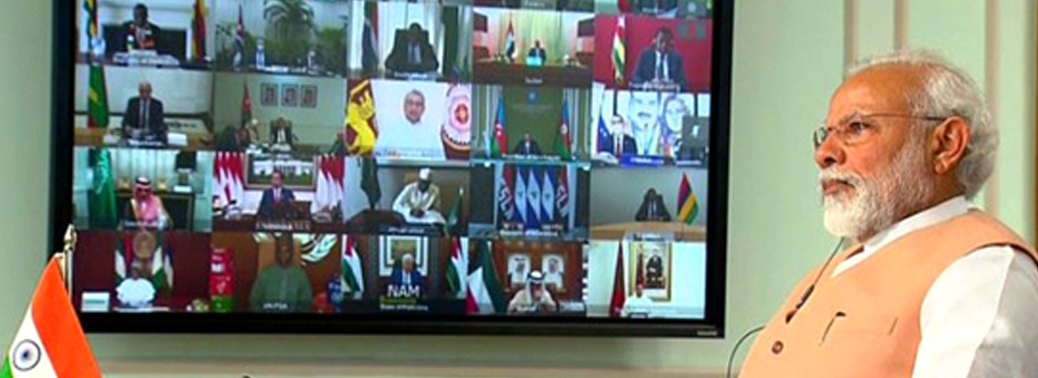PM SLAMS PAKISTAN IN VIRTUAL NAM SUMMIT
05, May 2020

Prelims level : International Policies & Schemes
Mains level : GS-II Important International institutions, agencies and fora- their Structure, Mandate.
Why in News?
- PM Narendra Modi made an indirect reference to Pakistan during an online meeting of the Non Aligned Movement (NAM) Contact Group, and said some countries were fomenting terrorism in the midst of the global coronavirus pandemic.
Significance of the Meeting:
- This is the first time PM Modi is taking part in a NAM meeting since taking 2014 when he first became the Prime Minister. The last time any Indian PM participated at Tehran NAM meet was 2012 with the then PM Man Mohan Singh was present.
- Both in 2016, 2018 summits of NAM, India was represented at Vice President Level. The last NAM Summit happened in 2019 in Azerbaijan, before that it was 2016 in Venezuela.
- Azerbaijan is the president of the grouping from 2019-2022 and the meet is being organised under the leadership of President of Azerbaijan Ilham Aliyev. The title of the summit is “We stand together against COVID-19”.
Highlights of the Summit:
- Prime Minister Modi highlighted India’s constructive role in dealing with the COVID-19 pandemic and said India has been carrying out “disaster management drills” while other countries had been organising military drills.
- He said the post-COVID-19 world order should be more representative. “The post-COVID world needs a new template for globalisation,” urging reform in international organisations.
- The summit leaders adopted a declaration underlining the importance of international solidarity in the fight against COVID-19.
What is Non- aligned Movement?
- The Non-Aligned Movement was formed during the Cold War as an organization of States that did not seek to formally align themselves with either the United States or the Soviet Union, but sought to remain independent or neutral.
- The basic concept for the group originated in 1955 during discussions that took place at the Asia-Africa Bandung Conference held in Indonesia.
- The first NAM Summit Conference took place in Belgrade, Yugoslavia, in September 1961.
- It has 120 members as on April 2018 comprising 53 countries from Africa, 39 from Asia, 26 from Latin America and the Caribbean and 2 from Europe (Belarus, Azerbaijan). There are 17 countries and 10 international organizations that are Observers at NAM.
- The Non-Aligned Movement was founded and held its first conference (the Belgrade Conference) in 1961 under the leadership of Josip Broz Tito of Yugoslavia, Gamal Abdel Nasser of Egypt, Jawaharlal Nehru of India, Kwame Nkrumah of Ghana, and Sukarno of Indonesia.
- The purpose of the organization was enumerated in Havana Declaration of 1979 to ensure “the national independence, sovereignty, territorial integrity and security of non-aligned countries” in their struggle against imperialism, colonialism, neo-colonialism, racism, and all forms of foreign subjugation.
- During the cold war era the NAM played a vital role in stabilizing the world order and preserving peace and security. Non alignment of NAM doesn’t mean the neutrality of state on global issues; it was always a peaceful intervention in world politics.
Principles of NAM:
- As J.L Nehru was founding members, the principles of NAM was largely guided by Panchsheel principles, some of them are:
- Respect for the principles enshrined in the charter of the United Nations and international law.
- Respect for sovereignty, sovereign equality and territorial integrity of all States.
- Peaceful settlement of all international conflicts in accordance with the charter of the United Nations.
- Respect for the political, economic, social and cultural diversity of countries and peoples.
- Defence and promotion of shared interests, justice and cooperation, regardless of the differences existing in the political, economic and social systems of the States, on the basis of mutual respect and the equality of rights.
- Respect for the inherent right of individual or collective self-defence, in accordance with the charter of the United Nations
- Non-interference in the internal affairs of States. No State or group of States has the right to intervene either directly or indirectly, whatever the motive, in the internal affairs of any other State.
- Promotion and defence of multilateralism and multilateral organisations as the appropriate frameworks to resolve, through dialogue and cooperation, the problems affecting humankind.
Why is it Losing Relevance Today?
- NAM today has grown into a forum where developing nations could blame all their problems on the big powers.
- It has become a platform for some of the world’s most despicable leaders to preen and posture.
- NAM’s reason to exist ended in 1989, with the collapse of the Soviet Union, and the end of the Cold War. The world was left with a single superpower, the US, but quickly became multipolar, with China and India emerging as strong magnetic forces in their own right.
Way Forward:
- There are now new kinds of alignments, more likely to be defined by economics and geography than by ideology.
- There is now no country in the world that can claim to be non-aligned.
- NAM has to adopt and change itself to suit the Newly Emerging Challenges and Geopolitics such as:
- World has again moved towards bi-polarity, one led by US and other by China-Russia. The war torn Syria is prime example of this, where both US and Russia is asserting power.
- The escalating tension in Indo-pacific region due to China’s assertion and US acting as a counterweight to check the Chinese expansionist policy.
- The large scale migration in Europe and Asia due to the unstable regimes and ethnic conflict in different Parts of world.
- Issue of global climate change and Occurence of catastrophic disasters raising demand to form global consensus to deal with it.
- Changing US policies, protectionism, prevalent terrorism and Nuclearisation of Middle East.
- Formation of multiple regional economic groupings like TPP and RCEP and fading away of multilateral bodies WTO from global arena.
< ul class = "inner">






